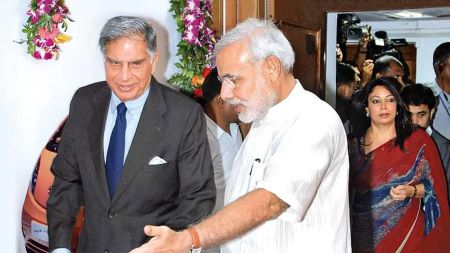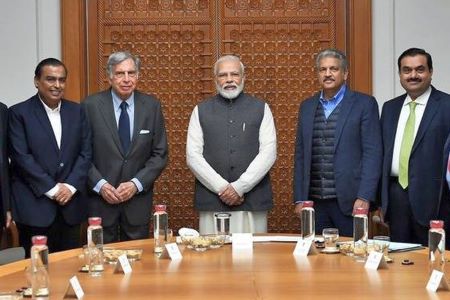Why is the Indian media going gaga over Ratan Tata after his death?
THESE DAYS, the Indian media and public have been awash with overwhelming accolades, panegyrics, eulogies, plaudits, encomiums, and glowing tributes for Ratan Tata following his death. The reverence shown towards him is akin to the passing of historical giants like Abraham Lincoln, Winston Churchill, or Lenin. Yet, we must pause and critically examine whether this admiration is warranted.
 To better understand his legacy, one must assess Ratan Tata beyond the glossy facade of philanthropy and the celebration of his corporate achievements. His business ventures, like those of many capitalists, were not insulated from controversy.
To better understand his legacy, one must assess Ratan Tata beyond the glossy facade of philanthropy and the celebration of his corporate achievements. His business ventures, like those of many capitalists, were not insulated from controversy.
For instance, one of the more contentious points in his career was his vocal support for Prime Minister Narendra Modi.
After the 2002 Gujarat riots, when Modi’s political and moral standing was under scrutiny due to the role his administration played during the violence, Tata lauded him as “a jewel in India’s crown.” This glowing endorsement disregarded the carnage and human rights violations faced by Muslims in Gujarat.
This raises the question: why would a businessman of Ratan Tata’s stature endorse a political figure mired in such controversy?

Narendra Modi with Ratan Tata
Some people say that Ratan Tata praised Modi as a routine business activity. After all, a businessman has to look after the interests of his company’s shareholders. He supposedly had nothing to do with politics.
My response to this argument is: Were the businessmen who financed Hitler in Germany, like Krupp and Thyssen, also doing routine business activity?
Was the firm IG Farben, which manufactured Zyklon B, used in gas chambers at Auschwitz, Treblinka, Sobibor, and elsewhere, merely engaging in routine business? After all, they too were protecting the interests of their shareholders.
By no means can we excuse them as such. The line between commerce and complicity becomes dangerously blurred when businessmen use politics for personal or corporate gain, ignoring moral implications.
 Similarly, it has been alleged that the Tata group sold critical technology to Israel, which was then used in its military campaigns, including the controversial war in Gaza, which many have termed genocidal. Can we merely dismiss this as another instance of “business as usual”? How do we separate profit-making from moral responsibility in the broader context of global conflicts and humanitarian concerns?
Similarly, it has been alleged that the Tata group sold critical technology to Israel, which was then used in its military campaigns, including the controversial war in Gaza, which many have termed genocidal. Can we merely dismiss this as another instance of “business as usual”? How do we separate profit-making from moral responsibility in the broader context of global conflicts and humanitarian concerns?
There is no denying that Ratan Tata, like Ambani or Adani, was a highly successful businessman. His philanthropic ventures are frequently highlighted, with initiatives in education, healthcare, and infrastructure often placed at the forefront of his legacy. However, philanthropy does not negate the larger ethical questions surrounding his business decisions.
After all, corporate social responsibility often serves to sanitize and distract from controversial or morally questionable practices undertaken by businesses. The global capitalist system, at its core, revolves around profit-making, and in this pursuit, morality often takes a backseat.

PM Narendra Modi with business leaders Mukesh Ambani, Ratan Tata, Anand Mahindra and Gautam Adani. Courtesy: ANI
In the end, what truly differentiates Ratan Tata from other business magnates? Is it his charitable initiatives, or is it the way the Indian media and public have chosen to elevate him to the status of a nation-builder?
We must remember that businesses thrive on creating favorable narratives for themselves, carefully crafting a public image that often hides the murkier aspects of their operations.
Ultimately, the idolization of Ratan Tata as a great philanthropist and national icon needs to be tempered with realism. He was, first and foremost, A Bania—a businessman—whose primary aim was profit. Like many in his position, his actions were not always aligned with ethical principles.
The public’s current euphoria surrounding his legacy will, in all likelihood, fade. Within a few weeks, as new events capture the media’s attention, the glorification of Ratan Tata will likely become just another chapter in the annals of corporate history, swiftly forgotten.
While he may be remembered for his contributions to India’s industrial growth, the need for a more nuanced and critical examination of his actions cannot be overstated. We must question the ethics of the business world and the real cost of progress, beyond the sanitized version we often see in the headlines. ![]()
Main image courtesy: srbhanja
Disclaimer : PunjabTodayNews.com and other platforms of the Punjab Today group strive to include views and opinions from across the entire spectrum, but by no means do we agree with everything we publish. Our efforts and editorial choices consistently underscore our authors’ right to the freedom of speech. However, it should be clear to all readers that individual authors are responsible for the information, ideas or opinions in their articles, and very often, these do not reflect the views of PunjabTodayNews.com or other platforms of the group. Punjab Today does not assume any responsibility or liability for the views of authors whose work appears here.
Punjab Today believes in serious, engaging, narrative journalism at a time when mainstream media houses seem to have given up on long-form writing and news television has blurred or altogether erased the lines between news and slapstick entertainment. We at Punjab Today believe that readers such as yourself appreciate cerebral journalism, and would like you to hold us against the best international industry standards. Brickbats are welcome even more than bouquets, though an occasional pat on the back is always encouraging. Good journalism can be a lifeline in these uncertain times worldwide. You can support us in myriad ways. To begin with, by spreading word about us and forwarding this reportage. Stay engaged.
— Team PT

